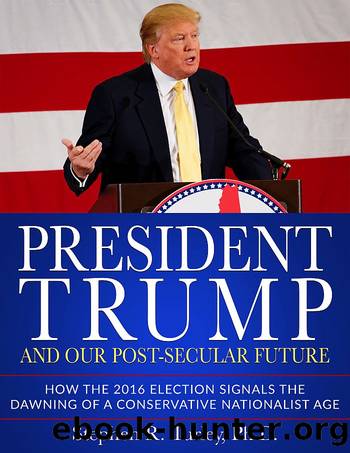President Trump and Our Post-Secular Future by Dr. Steve Turley

Author:Dr. Steve Turley
Language: eng
Format: epub
Publisher: Dr. Steve Turley
Published: 2019-03-20T00:00:00+00:00
Part II
President Trump and Our Post-Secular Future
CHAPTER 4
President Trump and the Global Religious Right
By now we are all too familiar with the refrains resounding from the mainstream media that celebrated prematurely the inevitable landslide victory of Hillary Clinton over Donald Trump. One of my favorites was from CNNâs Fareed Zakaria, who predicted confidently a few weeks prior to the election that Trump would lose the election and the Republican Party would be destroyed. Zakaria went on to morally denounce what he called âwhite Americaâ and their support of ending mass immigration and preserving Americaâs Christian heritage.
Along with such ridicule and denunciation were comparably disparaging remarks about the so-called Religious Right throughout the mainstream media. Headlines before the election such as âHow the religious right embraced Trump and lost its moral authority,â âDonald Trump made the Religious Right implode in less than a week,â and âThe Religious Rightâs Devotion to Donald Trump will End the Movement as We Know It,â confidently and all-too gleefully asserted the death of the defenders of traditional moral values with the demise of Trumpâs candidacy.
The irony of course is that the electoral results on November 8 served as the occasion for the humiliation of these prognosticators and pundits. Far from imploding, the Religious Right made up over 30 percent of the voting electorate.{iv} According to the Pew Research organization, white evangelical Christians voted for Trump by an utterly overwhelming margin, 81 percent to Clintonâs 16 percent. And Catholic voters, too, supported Trump over Clinton by a 23-point margin, 60 percent to 37 percent.{v}
What accounts for the mediaâs fallacious and erroneous coverage? Among many other things, the media largely failed to recognize that Trump and the Christian Right faced a common enemy: globalists and globalization. Thus, while the media were fixated on the discrepancy between the traditional values of conservative Christians and Trumpâs moral indiscretions, they overlooked the common globalizing concerns that both traditionalists and Trump shared.
Globalization is characterized as a worldwide social and economic system comprised of a capitalist economy, telecommunications, technology, and mass urbanization. It has been argued that such economic and technological dynamics have the power to arrest control of national economies away from totalitarian projects such as the former Soviet Union and communist China while simultaneously expanding economic growth and prominence among capitalistic nations.
However, what is crucial to understand is that built into globalization processes is what scholars have termed detraditionalization, or various mechanisms by which local customs and traditions are relativized to wider economic, scientific, and technocratic forces. It is no wonder then, that, beginning in the 1990s, representatives from the Religious Right began to see their domestic struggle with the ascendance of secular lifestyle values in far more globalist terms. Already in 1999, Harold O.J. Brown of the conservative Christian think tank, the Howard Center, delivered a speech at the Second World Congress entitled âGlobalization and the Family,â where he explained the relationship between globalization and changing social relations:
Globalization is the concept or ideal that tells us not that small is beautiful but that small is pitiful and out of date.
Download
This site does not store any files on its server. We only index and link to content provided by other sites. Please contact the content providers to delete copyright contents if any and email us, we'll remove relevant links or contents immediately.
| Anarchism | Communism & Socialism |
| Conservatism & Liberalism | Democracy |
| Fascism | Libertarianism |
| Nationalism | Radicalism |
| Utopian |
The Secret History by Donna Tartt(19096)
The Social Justice Warrior Handbook by Lisa De Pasquale(12191)
Thirteen Reasons Why by Jay Asher(8914)
This Is How You Lose Her by Junot Diaz(6890)
Weapons of Math Destruction by Cathy O'Neil(6282)
Zero to One by Peter Thiel(5804)
Beartown by Fredrik Backman(5759)
The Myth of the Strong Leader by Archie Brown(5510)
The Fire Next Time by James Baldwin(5450)
How Democracies Die by Steven Levitsky & Daniel Ziblatt(5219)
Promise Me, Dad by Joe Biden(5154)
Stone's Rules by Roger Stone(5088)
A Higher Loyalty: Truth, Lies, and Leadership by James Comey(4965)
100 Deadly Skills by Clint Emerson(4927)
Rise and Kill First by Ronen Bergman(4790)
Secrecy World by Jake Bernstein(4754)
The David Icke Guide to the Global Conspiracy (and how to end it) by David Icke(4720)
The Farm by Tom Rob Smith(4514)
The Doomsday Machine by Daniel Ellsberg(4491)
